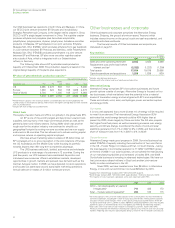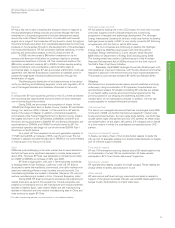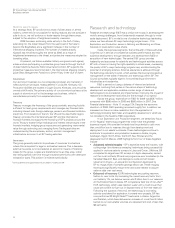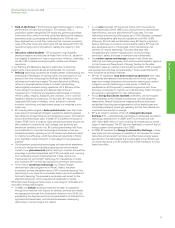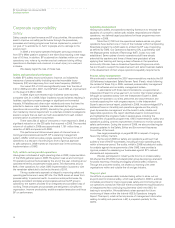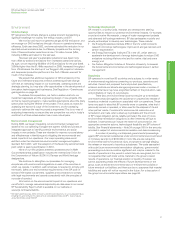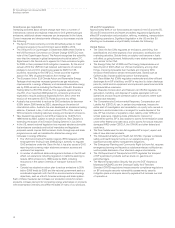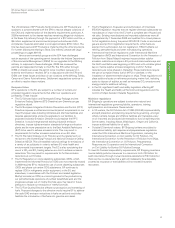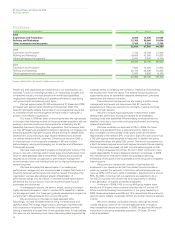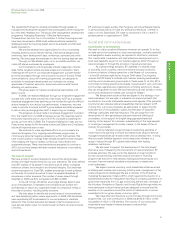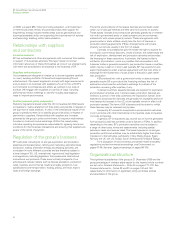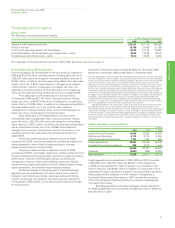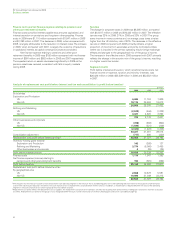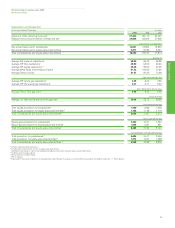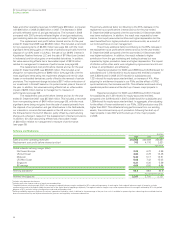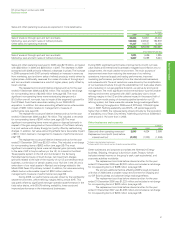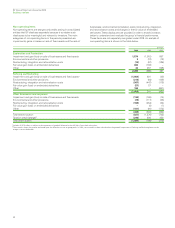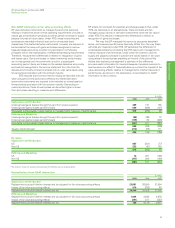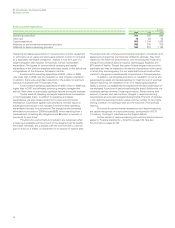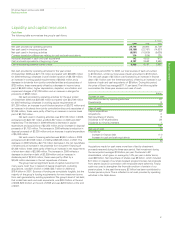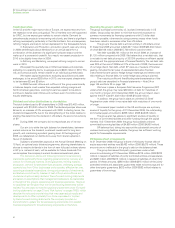BP 2009 Annual Report Download - page 54
Download and view the complete annual report
Please find page 54 of the 2009 BP annual report below. You can navigate through the pages in the report by either clicking on the pages listed below, or by using the keyword search tool below to find specific information within the annual report.
52
BP Annual Report and Accounts 2009
Business review
In 2009, we spent $55 million promoting education, with investment
in three broad areas: tertiary and post secondary level support for
engineering; energy industry-related areas such as geo-science and
business leadership skills; and supporting the improvement of science
and technology teaching within basic education.
Relationships with suppliers
and contractors
Essential contracts
BP has contractual and other arrangements with numerous third parties
in support of its business activities. This report does not contain
information about any of these third parties as none of our arrangements
with them are considered to be essential to the business of BP.
Suppliers and contractors
Our processes are designed to enable us to choose suppliers carefully
on merit, avoiding conflicts of interest and inappropriate gifts and
entertainment. We expect suppliers to comply with legal requirements
and we seek to do business with suppliers who act in line with BP’s
commitments to compliance and ethics, as outlined in our code of
conduct. We engage with suppliers in a variety of ways, including
performance review meetings to identify mutually advantageous
ways to improve performance.
Creditor payment policy and practice
Statutory regulations issued under the UK Companies Act 2006 require
companies to make a statement of their policy and practice in respect of
the payment of trade creditors. In view of the international nature of the
group’s operations there is no specific group-wide policy in respect of
payments to suppliers. Relationships with suppliers are, however,
governed by the group’s policy commitment to long-term relationships
founded on trust and mutual advantage. Within this overall policy,
individual operating companies are responsible for agreeing terms and
conditions for their business transactions and ensuring that suppliers are
aware of the terms of payment.
Regulation of the group’s business
BP’s activities, including its oil and gas exploration and production,
pipelines and transportation, refining and marketing, petrochemicals
production, trading, alternative energy and shipping activities, are
conducted in many different countries and are therefore subject to
a broad range of EU, US, international, regional and local legislation
and regulations, including legislation that implements international
conventions and protocols. These cover virtually all aspects of our
activities and include matters such as licence acquisition, production
rates, royalties, environmental, health and safety protection, fuel
specifications and transportation, trading, pricing, anti-trust, export,
taxes and foreign exchange.
The terms and conditions of the leases, licences and contracts under
which our oil and gas interests are held vary from country to country.
These leases, licences and contracts are generally granted by or entered
into with a government entity or state company and are sometimes
entered into with private property owners. These arrangements with
governmental or state entities usually take the form of licences or
production-sharing agreements (PSAs). Arrangements with private
property owners are usually in the form of leases.
Licences (or concessions) give the holder the right to explore for
and exploit a commercial discovery. Under a licence, the holder bears the
risk of exploration, development and production activities and provides
the financing for these operations. In principle, the licence holder is
entitled to all production, minus any royalties that are payable in kind.
A licence holder is generally required to pay production taxes or royalties,
which may be in cash or in kind. Less typically, BP may explore for and
exploit hydrocarbons under a service agreement with the host entity in
exchange for reimbursement of costs and/or a fee paid in cash rather
than production.
PSAs entered into with a government entity or state company
generally require BP to provide all the financing and bear the risk of
exploration and production activities in exchange for a share of the
production remaining after royalties, if any.
In certain countries, separate licences are required for exploration
and production activities and, in certain cases, production licences are
limited to a portion of the area covered by the exploration licence. Both
exploration and production licences are generally for a specified period of
time (except for licences in the US, which typically remain in effect until
production ceases). The term of BP’s licences and the extent to which
these licences may be renewed vary by area.
Frequently, BP conducts its exploration and production activities
in joint ventures with other international oil companies, state companies
or private companies.
In general, BP is required to pay income tax on income generated
from production activities (whether under a licence or PSAs). In addition,
depending on the area, BP’s production activities may be subject to
a range of other taxes, levies and assessments, including special
petroleum taxes and revenue taxes. The taxes imposed on oil and gas
production profits and activities may be substantially higher than those
imposed on other activities, particularly in Abu Dhabi, Angola, Egypt,
Norway, the UK, the US, Russia, South America and Trinidad & Tobago.
For a discussion of environmental and certain health and safety
regulations and environmental proceedings, see Environment on
pages 47-49. See also Legal proceedings on pages 99-100.
Organizational structure
The significant subsidiaries of the group at 31 December 2009 and the
group percentage of ordinary share capital (to the nearest whole number)
are set out in Financial statements – Note 43 on pages 177-178. See
Financial statements – Notes 22 and 23 on pages 142 and 143
respectively for information on significant jointly controlled entities
and associates of the group.


